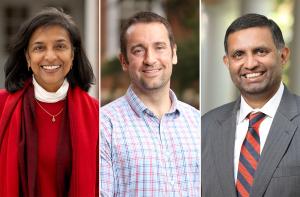
Faculty representing three disciplines in the University of Virginia School of Engineering and Applied Science — computer science, mechanical and aerospace engineering, and civil and environmental engineering — have been elected to the rank of fellow by the American Association for the Advancement of Science.
The AAAS is one of the world’s largest general scientific societies and publisher of the Science family of journals. UVA Engineering’s faculty are among 471 scientists and engineers named in the class of 2024, according to the AAAS.
Fellows are selected for “meritorious contribution to the advancement of science and engineering.”
“I’m thrilled that these members of our faculty have been recognized by AAAS,” said Jennifer L. West, the Saunders Family Professor of Engineering and dean of the school. “Sandhya, Patrick and Venkat exemplify the strength of our faculty across disciplines. Their election underscores their many valuable contributions in their respective fields as well as the UVA community.”
UVA Engineering’s New AAAS Fellows
Sandhya Dwarkadas, the Walter N. Munster Professor and chair of the Department of Computer Science, was elected for “cutting-edge work in computer architecture, parallel and distributed computing, and issues at the interface of hardware and software with a particular focus on sharing and concurrency control.”
Dwarkadas has made fundamental contributions to the design and implementation of shared memory in hardware and software. Her work also helps systems automatically adjust their settings to save energy and use resources efficiently. Her innovations improved the speed, energy efficiency and ease of use of modern computing systems.
Patrick E. Hopkins, the Whitney Stone Professor of Engineering in the Department of Mechanical and Aerospace Engineering, was elected for “excellence in research in energy transport and coupled photonic interactions with condensed matter, soft materials, liquids, vapors, plasmas and their interfaces.”
Hopkins is known for developing methods and instruments using powerful lasers to measure thermal conductivity: how energy moves through and interacts with materials in different states. He focuses on how heat and light behave at their boundaries — for instance, how temperature changes at interfaces between two different materials or states of matter.
Venkataraman “Venkat” Lakshmi, the John L. Newcomb Professor of Engineering in the Department of Civil and Environmental Engineering, was elected for “distinguished contributions to the field of hydrology, particularly for the monitoring of global water resources and hydrological extremes, including floods, droughts, landslides, permafrost thaw and wildfires.”
Lakshmi is an international authority on studies of hydrological extremes using remote-sensing — aerial and satellite imagery, for example — and in-place “Earth observations” to collect data and modeling to study the terrestrial water cycle and better understand weather, climate and ecology.